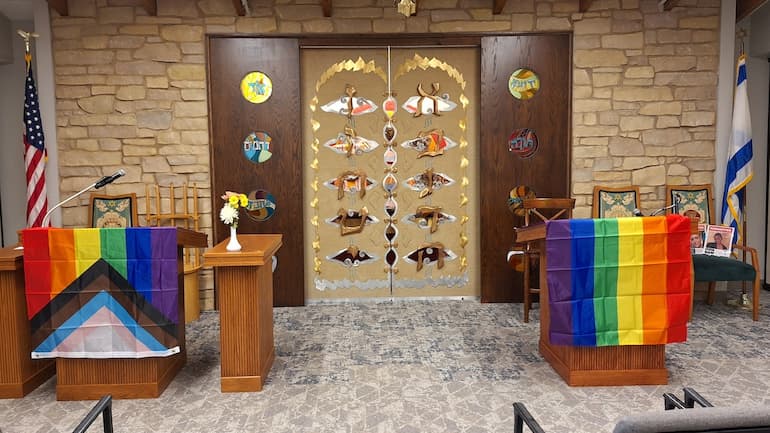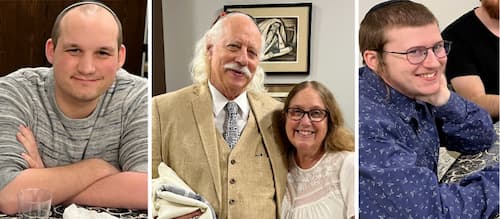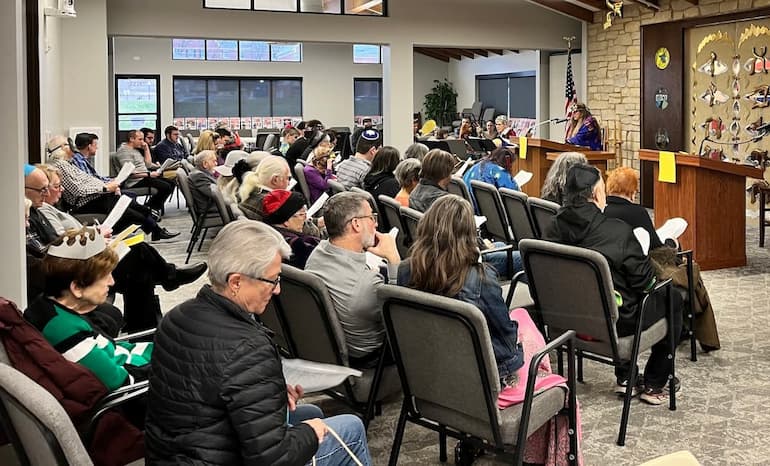DAVENPORT, IA. – Featuring LGBTQ affirming language and rainbow-colored challah, Jewish Pride-themed events will take place in the Quad Cities for the first time ever this Friday and Saturday.
Not only are these the first-ever Jewish Pride month events in the seven-city Quad Cities metropolis; the two events happening this weekend in Davenport may be only the second and third Pride Shabbat services happening across Iowa and Illinois this Pride season. A Vernon Hills, Ill., group hosts its Pride Shabbat June 21. Pride Shabbat services are gradually growing nationwide, and Buffalo Grove is among those communities that have offered them in previous years.

A peek at how the Beit Shalom synagogue in Davenport is adorned for LGBTQ+ Pride month.
In the Quad Cities, a Pride Shabbat happens Friday at 6:30 p.m. and a Pride Service is 10:30 a.m. Saturday. Both events take place at Beit Shalom, 2215 Kimberly Rd., a location shared by the Temple Emanuel of the Reform movement of Judaism, and the Conservative-identified Congregation Beth Israel.
Though following different movements of Judaism, the two congregations share a commitment to accept, welcome and champion LGBTQ+ people, say organizers of the Shabbat and Pride Services.
“I am one of the LGBTQ members of our community. It would mean a lot to me to show that this community is accepting of all of those people,” says Ezekiel Aurelius, who started the idea for Pride services along with fellow LGBTQ+ congregation member Brandon Milroy. He’s contacted numerous community groups, including Clock Inc. LGBT+ Community Center, to spread word about the events.

Brandon Milroy, Rabbi Linda Bertenthal and husband Phil, and Ezekiel Aurelius, organizers of the Pride Shabbat Friday and the Congregation Beth Israel Pride Service Saturday in Davenport.
“If there’s any Jews in particular who didn’t think that they could be accepted at this congregation, they are more than welcome. So the message has been passed out, and hopefully they shall attend.” Non-Jewish people are also welcome to attend.
Rabbi: Judaism may hold unique appeal to LGBTQ+ people
Bertenthal said her experience has shown that Judaism has a strong appeal to LGBTQ+ people. In the past five years, she says, two-thirds to three-fourths of those she’s helped convert to Judaism have identified as LGBTQ+.
“I think there’s something about Judaism, with our approach of questioning everything… being willing to grab on to multiple answers and try and affirm them all, and see how we can progress ethically by exploring new answers to old questions,” Bertenthal says. “There’s something about those aspects of Judaism that make for just kind of a wonderful home for everyone.”
Rabbi Steve Schwartz, a Baltimore rabbi who writes the blog “The Human Side of the Coin,” says holding a Pride Shabbat service is a way to express a basic tenet of Judaism: that all are equal in the eyes of God.
“When we say that all people are holy, it also means that God holds up each individual – every single human being – and says ‘you, too, are my child,’ “ Schwartz writes. In addition, “In today’s environment, where about a third of the states in the country are either proposing or passing legislation that threatens the queer community, the queer community needs to know from the Jewish community that they are not only welcome, but respected, cared for, and loved.”
Bertenthal echoes Schwartz’s explanation, saying that when religions label being LGBTQ+ as sinful, they are “cutting off parts of the stream” of God.
“It’s, to me, the deepest heresy to to cut off anyone and say, ‘Oh no, they’re not entitled to, for example, engage in the sacred institution of marriage.’ That would make marriage less holy for all of us because it’s less reflective of God’s image, which includes all of us.”

Rabbi Linda Bertenthal teaches during a recent service at Beit Shalom in Davenport.
What to expect at the Pride Shabbat and the Pride Service
Bertenthal and Aurelius offered a historical, and practical, explanation of how the two services this weekend differ. Language will be infused throughout the services that offer a nod to LGBTQ+ people, Aurelius said. For example, the blessings will include thanks for “making someone trans’ “ or “making us nonbinary.” And the challah bread will be rainbow-colored.
Pride Shabbat, Friday evening
The evening service will be like a “normal Kabbalat Shabbat,”says Aurelius. Shabbat is the Jewish word for recognizing the weekly day of rest or “sabbath,” which is the seventh day of every week starting Friday evening and continuing through Saturday evening. The Kabbalat Shabbat is a “welcoming, receiving” experience that typically features songs, readings, blessings and breaking of bread.
“If you want the more kind of peppy musical, you come in the evening,” says Bertenthal. That’s also the service coordinated by Temple Emanuel, which has been a Reform Jewish congregation for the past 130 years.
Pride Service, Saturday morning
The morning gathering is coordinated by Congregation Beth Israel, which more resembles the Conservative movement of Judaism that undertakes change more slowly and offers more traditional rituals, Bertenthal says. “If you want the more stately, traditional, or reading from the Torah, come in the morning.” That service also tends to last a little longer.
If you’d like to attend one of the two services, but are not a member of either congregation, as a security measure you’re asked to pre-register by calling:
• 563-326-4419 for the Temple Emanuel service Friday evening
• 309-788-3426 for the Congregation Beth Israel service Saturday morning
“We welcome not just Jews, but seekers,” says Bertenthal, “and just people who want to be more educated and learn how to be good allies to Jews in the community.”
(photos courtesy of Ezekiel Aurelius and Rabbi Linda Bertenthal)

